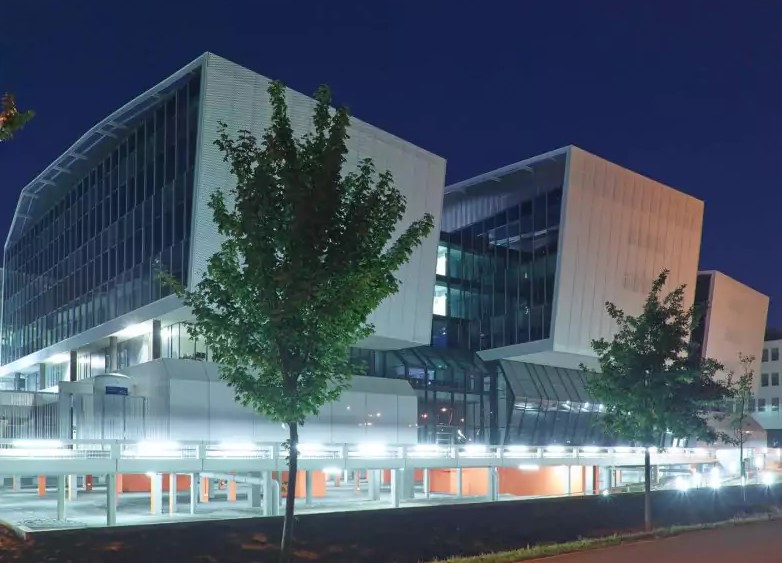

A session on health was organized in partnership with the Cancer Research Center of the French National Institute of Health and Medical Research (INSERM), the National Center for Scientific Research (CNRS), and the University of Toulouse (photo: INSERM, Toulouse)
Researchers affiliated with São Paulo’s universities, research institutions, companies, and science and technology-based startups participate in another edition of FAPESP Week in Toulouse and Paris.
Researchers affiliated with São Paulo’s universities, research institutions, companies, and science and technology-based startups participate in another edition of FAPESP Week in Toulouse and Paris.

A session on health was organized in partnership with the Cancer Research Center of the French National Institute of Health and Medical Research (INSERM), the National Center for Scientific Research (CNRS), and the University of Toulouse (photo: INSERM, Toulouse)
By Elton Alisson, from Toulouse | Agência FAPESP – From June 10th to 12th, a group of Brazilian researchers affiliated with universities and research institutions in São Paulo, as well as science and technology-based companies and startups, will be presenting their research and innovation results in the areas of health and aeronautics in Toulouse, the capital of the Occitanie region in southern France. These activities are part of the initial program for FAPESP Week France.
Now in its 25th edition, this series of international symposiums has, since 2011, created opportunities and facilitated scientific collaboration between Brazilian scientists, particularly those from the state of São Paulo, and scientists from other continents.
“These events raise the profile of research carried out in the state of São Paulo and supported by FAPESP, strengthen existing collaborations with the partners involved, and create new dynamics for cooperation based on the international cooperation tools of the institution and similar research and innovation funding agencies,” said Raul Machado, advisor to the Presidency of FAPESP and coordinator of the FAPESP Week initiative.
The FAPESP Weeks bring together leading São Paulo researchers and their colleagues from the target region for various activities, including presentations, roundtable discussions, startup pitches, and networking opportunities. In recent editions, FAPESP has also encouraged the participation of startups supported by its Innovative Research in Small Businesses Program (PIPE).
The Foundation and its partners organize the events in the chosen country, which may be held at one or more institutions and one or more cities within the same region or country. For example, FAPESP Week France will take place in Toulouse and Paris.
In Toulouse, the session on aeronautics will be held at the Higher Institute of Aeronautics and Space (ISAE-SUPAERO). The session on health will take place at the Hôtel-Dieu Saint-Jacques, in partnership with the Cancer Research Center of the French National Institute of Health and Medical Research (INSERM), the National Center for Scientific Research (CNRS), and the University of Toulouse, in parallel with the session on aeronautics.
The session on health is an offshoot of a health research workshop promoted by FAPESP and the Consulate General of France in São Paulo in June 2024 (read more at: agencia.fapesp.br/52160).
“The state of São Paulo has established expertise in the two topics that will be addressed in Toulouse [health and aeronautics]. Health is the primary area of research supported by FAPESP, and São Paulo has the most consolidated and dense aeronautical research environment in Latin America,” emphasizes Machado.
In contrast, Toulouse is the European capital of aeronautics and aerospace engineering. It is home to one of the world’s largest aircraft manufacturers and an internationally recognized oncology research center. “These were some of the reasons for choosing this French city to host part of the FAPESP Week France program,” explains Machado.
Program in Paris
In Paris, two scientific forums will be held in partnership with the National Museum of Natural History (MNHN). The first forum, which focuses on museology, will take place from Thursday, June 12th, to Friday, June 13th, and will address the question “What kind of natural history museum is needed in the 21st century?” The second forum, focusing on forests, biodiversity, and human societies, will be held from June 16th to 18th.
In parallel with the scientific forums, FAPESP will also be present at the VivaTech international fair in Paris in partnership with the University of São Paulo (USP). VivaTech is one of Europe’s leading technology and startup events and will take place from June 11th to 14th.
During the four-day event, startups and researchers from USP, supported by FAPESP, will have the opportunity to expand strategic connections, increase the international visibility of their research and products, and attract new investors. They will showcase Brazilian expertise in science and innovation and in the generation of high-impact, applied solutions to address today’s global challenges, at a 100-square-meter stand.
The program for the USP and FAPESP space includes thematic sessions by professors and 19 startups, nine of which are PIPE-FAPESP supported. There will be interactive demonstrations of technologies for investors and the general public, as well as virtual reality experiences and an exhibition of prototypes and models. The startups will also participate in a competitive pitch.
Of the nine startups supported by PIPE-FAPESP that will participate in VivaTech, four will also be part of the lecture program in Toulouse: two in biotechnology and two in aeronautics. “The presentations by these startups will be interspersed with scientific lectures,” says Machado.
The activities of FAPESP Week France are part of the Year of Brazil in France calendar, which includes various activities in more than 50 French cities.
For more information about FAPESP Week France, visit fapesp.br/week/2025/france.
Republish
The Agency FAPESP licenses news via Creative Commons (CC-BY-NC-ND) so that they can be republished free of charge and in a simple way by other digital or printed vehicles. Agência FAPESP must be credited as the source of the content being republished and the name of the reporter (if any) must be attributed. Using the HMTL button below allows compliance with these rules, detailed in Digital Republishing Policy FAPESP.





